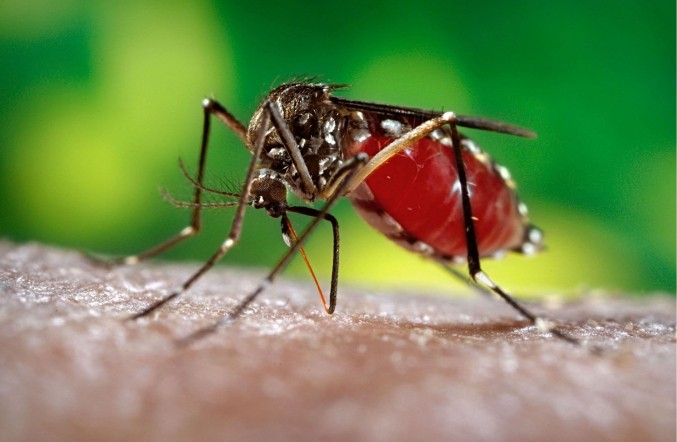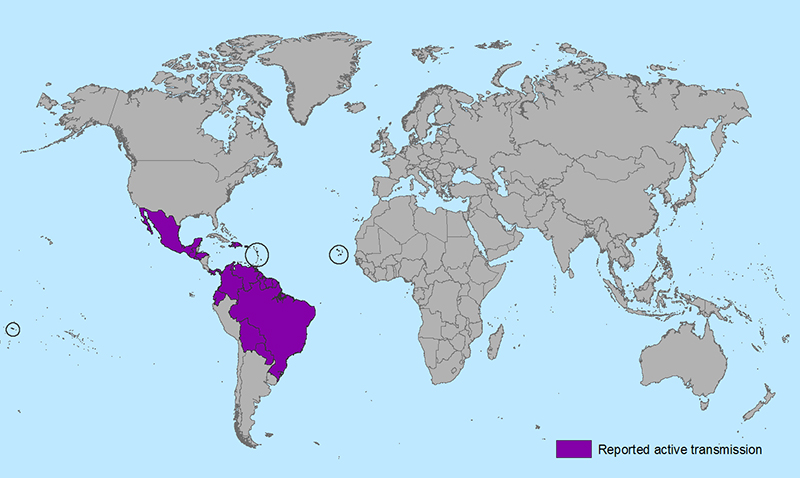The Zika virus is currently being seen in epidemic numbers in at least 22 countries, some of which are popular tropical travel destinations. In fact, the Center for Disease Control for the first time ever issued a travel warning specifically for pregnant women last week cautioning about travel to areas where the Zika virus is rampant. Here is what you might want to know about the Zika virus.
What is the Zika virus and how is it transmitted?
The Zika virus is a mosquito-borne illness that was first discovered in 1947 in Uganda, but until 2007, the virus really was not seen in humans. The Zika virus is transmitted through the bite of the Aedes mosquito, which is also the mosquito responsible for transmitting Chikungunya and Dengue viruses as well. Unlike the Culex species of mosquito that transmits West Nile Virus and mainly likes to bite in the dawn and dusk hours, the Aedes mosquito prefers to feed on its host during the daytime hours.
What are the symptoms of the Zika virus?
It is estimated that 80% of people who are infected with the Zika virus will have no symptoms at all, and the other 20% could have a very mild illness with symptoms such as fever, rash, red eyes and joint pain. These symptoms generally occur within 2-7 days after a person is infected with the virus, and the illness likely will last a few days to a week. There is concern about a possible link between the Zika virus and Guillain-Barre Syndrome, which is an autoimmune related neurologic disease that may lead to paralysis.
So why is it a big deal for pregnant women?
There has been an alarming increase in a birth defect known as microcephaly, or babies being born with abnormally small heads, in countries where the Zika virus is very common. Infants born with microcephaly may also have abnormalities of their brain because of incomplete development. Brazil, in particular, has seen more than 3,800 cases of microcephaly since October 2015, which is more than a 25-fold increase in the rates of microcephaly when compared to previous years. There is also concern that the Zika virus could cause loss of pregnancy. Scientist are feverishly working to determine just how strong the link between the Zika virus and microcephaly and pregnancy loss is, but the trend is concerning enough that health officials have taken notice.
Is this the first virus that can cause problems for developing fetuses?
No. Viruses causing birth defects are nothing new. Viruses such as rubella, cytomegalovirus, parvo B19 and even chickenpox can be transmitted from a pregnant mother to the fetus and can cause a host of problems in a baby ranging from hearing loss to anemia to small size of the baby. However, most women have had either been vaccinated against (think MMR and chickenpox vaccine) or have had these virus by the time they reach childbearing age, and therefore, already have immunity from these illnesses. Since the Zika virus is just emerging and there is no preventative vaccine, we do not have any protection from this virus.
Have there been any cases of the Zika virus here in the US?
No…and yes! 234 pregnant women in the US have been diagnosed with Zika virus, acording to the CDC. The CDC hasn’t disclosed where any of these women were infected with the virus, or how they came in contact with it. So far, three babies have been born in the US with Zika-linked birth defect microcephaly. The defects were also seen in three other pregnancies that ended. All the cases are connected to travel to areas with outbreaks of the mosquito-borne virus, primarily Latin America and the Caribbean. There’s been no local spread of Zika in the U.S.
What should expectant mommies do?
If you were planning a trip to one of the areas on the CDC travel advisory list, I would put those travel plans on hold! We spend 9 months doing everything in our power to protect our growing little bundles of joy possibly giving up our favorite raw sushi roll, our morning extra venti caffeinated latte, or foregoing your next skydiving adventure (not sure that I would ever be brave enough for that one honestly). There is so much about pregnancy that we cannot predict, so in my opinion, we should try to limit those things that are known risks. Until more is know about the Zika virus and how it may specifically affect a growing fetus, I would encourage pregnant women to err on the side of abundant caution and avoid travel to those areas inundated with the Zika virus.
If travel to one of the countries with a Zika outbreak is unavoidable, how can women protect themselves?
You must make sure to take precautions against mosquito bites. Use either a DEET or Picaridin containing mosquito repellent at all times (remember, the Aedes mosquito likes to bite during the day and not only dusk ‘till dawn like other mosquitoes). Also, wear lightweight long sleeves and pants and even clothing that is permethrin-treated to cover as much of the skin as possible. Finally, if your lodging is open to the outdoors, make sure to have a mosquito bed net over where you will be sleeping.
I am not usually one to “sound the alarm” before I have a wealth of data and information in front of me, but the Zika virus and its possible association with a severe birth defect warrants our attention. While a change to travel plans is not convenient (especially when you have been looking forward to crystal blue water, a beach chair and a virgin pina colada), the beaches will still be there in a few months and scientist will have had the time to further research how a tiny virus from a pesky mosquito could cause lifelong problems for your still growing baby.
“Ask the Experts” is a series on Baton Rouge Moms where local experts share their thoughts, opinions and answer questions relating to health, wellness and parenting. If you have a question for one of our experts, please leave it in the comments below to be featured in an upcoming article.






